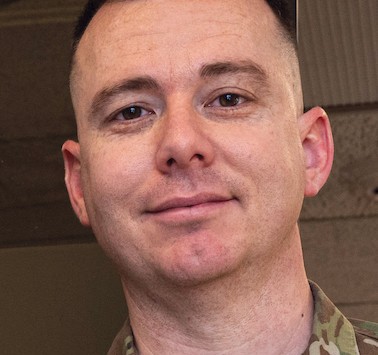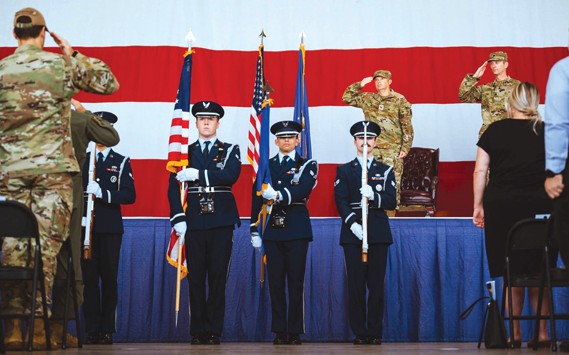How capable are you of recovering from life’s misfortunes? Do you have the tools necessary to tackle life’s obstacles?
September is Suicide Awareness and Prevention month. The Luke Air Force Base helping agencies have joined forces this month to highlight the importance of equipping yourself with the proper mental, spiritual, social and physical “gear” to overcome life’s challenges.
Supporting your and other’s efforts to obtain the proper resilience equipment is one of the best ways Airman can ensure suicide prevention remains a focus of our wingman culture. This begins with individuals taking care of both themselves and others by building healthy relationships and supporting one another when life happens. Isolation and the notion that “only the weak seek help” is an obstacle to healthy living. Instead, we need to recognize it is a sign of courage and commitment to ask for help when facing life’s challenges.
Here are some ways to strengthen yourself and your fellow Airmen and overcome stress that can lead to isolation and suicidal thoughts:
Mental:
1. Think positively! You can do this by focusing on the positive aspects of life and by avoiding groups or relationships that are negative
2. Find activities to engage in daily that reduce stress … don’t let it accumulate
3. Manage problems up front … don’t avoid them
4. Adopt the belief that things can always get better
Physically:
1. Get an adequate amount of sleep for physical and mental rejuvenation
2. Invest in nutrition and learning about foods that can positively affect your energy, mood and mental status
3. Take some time to exercise each day to reduce stress and help alleviate anger and anxiety
4. Reduce the use of substances such as caffeine and tobacco as they can add to your stress level
Spiritually:
1. Examine your core values and sense of purpose and commitment – are you living in accordance with your values?
2. Identify supportive individuals in your spiritual community that are available for counseling and guidance
3. Engage in fellowship, meditation, or prayer
4. Take time often to reach outside of yourself and “give back” or help others as it builds character and helps put things into perspective for your own life
Socially:
1. Surround yourself with supportive and positive friends
2. Find a mentor to provide personal and professional guidance
3. Join a group that interests you
4. Stay connected to family and friends
Even the most resilient of us can start to get overwhelmed with problems and life challenges. Be on the lookout for warning signs and risk factors for suicide. It is important for us to have the knowledge, courage and initiative to identify within ourselves or in other individuals who may be overwhelmed, and to intervene.
Be aware of the warning signs:
• Threatening or talking about wanting to hurt or kill oneself
• Looking for ways to kill oneself by seeking access to firearms, pills or other means
• Talking or writing about death, dying or suicide
• Feeling hopeless
• Feeling rage, uncontrolled anger, or seeking revenge
• Acting reckless or engaging in risky activities
• Feeling trapped — like there’s no way out
• Increasing alcohol or drug use
• Withdrawing from friends, family and society
• Feeling anxious and agitated
• Being unable to sleep or sleeping all the time
• Experiencing dramatic mood changes
• Seeing no reason for living or having no sense of purpose in life
If you or someone you know is in immediate danger or exhibits any of the above signs, don’t hesitate to call the National Suicide Prevention Lifeline at 800-273-TALK (8255) or go to the nearest emergency room. Use the ACE model, ASK, CARE, ESCORT. First, ask the question, “Are you feeling suicidal?” or “Are you having thoughts of wanting to hurt yourself?” Next, listen sincerely and care for the person. Finally, never leave a suicidal person alone. Instead, escort the person to someone who can help, whether you take your friend to help or call the help to you. Listed below are the agencies and resources that can provide you with additional education and assist you and your fellow Airman in building your resiliency and preventing suicide.
Agencies
Check out the You Matter license plate resource link at www.luke.af.mil for all the links and contact information to each of Luke’s helping agencies.
Additional resources
National Sleep Foundation: http://www.sleepfoundation.org/
USDA’s Choose My Plate (New Food Guide Pyramid): http://www.choosemyplate.gov/
Real Warriors Campaign: 866-966-1020 – www.realwarriors.net
Wellness Resources for the Military Community www.afterdeployment.org
Medal of Honor: http://www.medalofhonorspeakout.org/
Defense Centers of Excellence for Psychological Health & Traumatic Brain Injury: http://www.dcoe.health.mil/
Human Performance Resource Center: http://humanperformanceresourcecenter.org/
Military OneSource: 800-342-9647 – www.militaryonesource.com
National Suicide Prevention Lifeline: 800-273-TALK (8255) – www.suicidepreventionlifeline.org
Courtesy of 56th Medical Group











